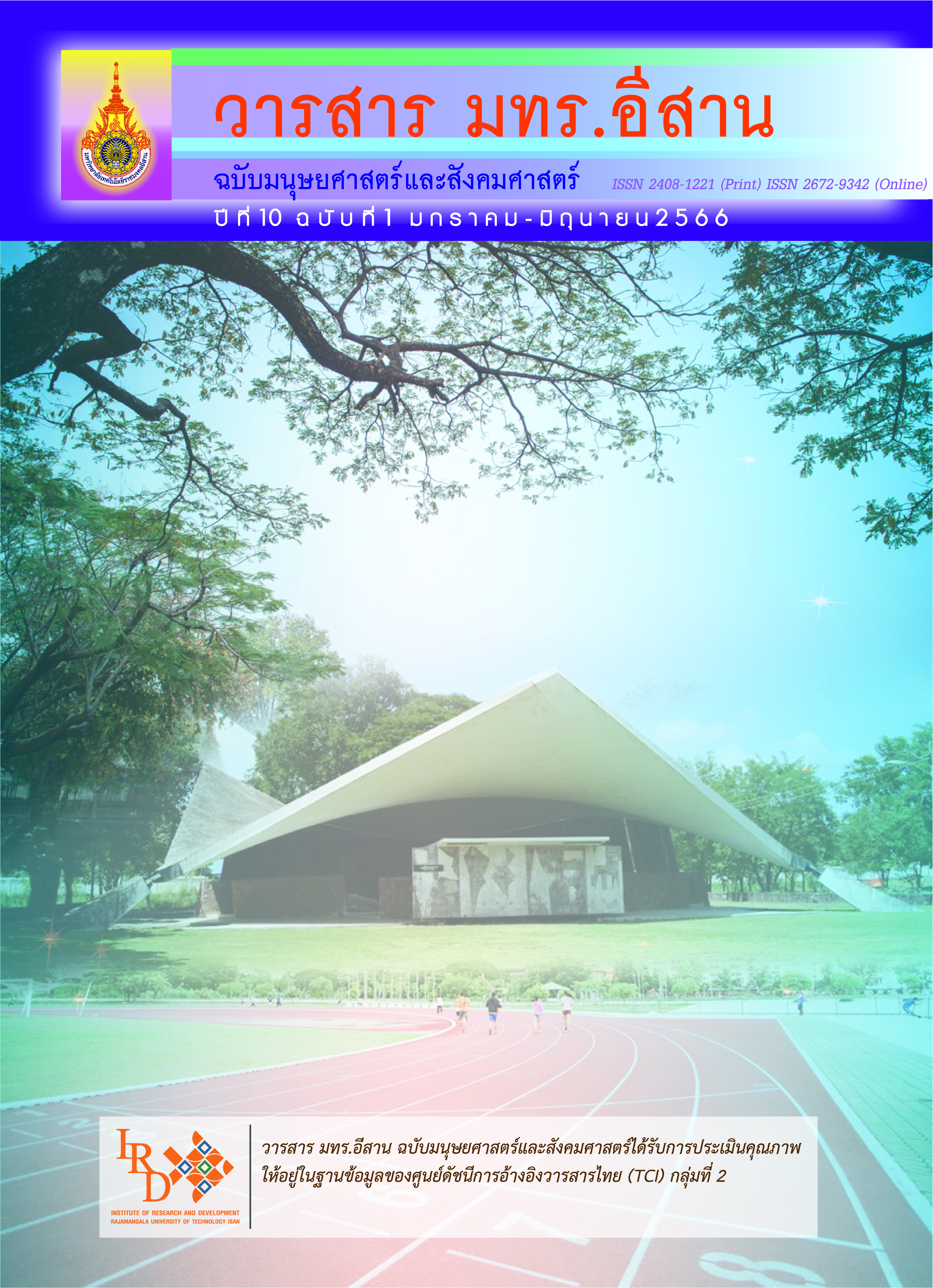The Important Factors Affecting Boutique Hotel Customers’ Behavioral Intentions
Main Article Content
Abstract
This research aimed to study factors affecting the behavioral intentions of boutique hotel customers and the influence of important factors on those intentions. This research applied the quantitative method to collect data from 600 Thai boutique hotel customers. The research instrument was a questionnaire. The data were analyzed using descriptive statistics, including
percentage, mean, standard deviation, frequency, and inference statistics, including Pearson’s correlation coefficient, and structural equation modeling (SEM). According to the research results, the factors that have a statistically significant direct effect (b = 0.292, b= 0.527) on the behavioral intention of boutique hotel customers are customer experience and perceived value, which directly affect the statistically significant behavioral intent of boutique hotel customers. and e-marketing factors indirectly affect the behavioral intentions of boutique hotel customers, with the customer experience (b = 0.234) and perceived value (b = 0.277) as the intermediate variables. However, if the boutique hotel operator uses this research information in business operations, it will result in customers having a behavioral intention to repurchase the boutique hotel service. Support, recommendations, word of mouth, and repurchases are all examples. This will create a sustainable competitive advantage in the future.
Article Details

This work is licensed under a Creative Commons Attribution-NonCommercial-NoDerivatives 4.0 International License.
บทความที่ได้รับการตีพิมพ์เป็นลิขสิทธิ์ของมหาวิทยาลัยเทคโนโลยีราชมงคลอีสาน
ข้อความที่ปรากฏในบทความแต่ละเรื่องในวารสารวิชาการเล่มนี้เป็นความคิดเห็นส่วนตัวของผู้เขียนแต่ละท่านไม่เกี่ยวข้องกับมหาวิทยาลัยเทคโนโลยีราชมงคลอีสานและคณาจารย์ท่านอื่นๆในมหาวิทยาลัยฯ แต่อย่างใด ความรับผิดชอบองค์ประกอบทั้งหมดของบทความแต่ละเรื่องเป็นของผู้เขียนแต่ละท่าน หากมีความผิดพลาดใดๆ ผู้เขียนแต่ละท่านจะรับผิดชอบบทความของตนเองแต่ผู้เดียว
References
กัลยา วานิชย์บัญชา. (2556). การวิเคราะห์สมการโครงสร้าง (SEM) ด้วย AMOS. กรุงเทพฯ: สามลดา
ธานินทร์ ศิลป์จารุ. (2560). การวิจัยและวิเคราะห์ข้อมูลทางสถิติด้วย SPSS และ AMOS. พิมพ์ครั้งที่ 17. กรุงเทพฯ: เอส อาร์ พริ้นติ้ง แมสโปรดักส์
ธารีทิพย์ ทากิ. (2549). การจัดการงานส่วนหน้าของโรงแรม. กรุงเทพฯ: ซีเอ็ดยูเคชั่น
นาฏอนงค์ นามบุดดี และอินทกะ พิริยะกุล. (2565). การเล่าตำนานและประสบการณ์ลูกค้าที่ส่งเสริมบตูิคโฮเตล รีโซแนนซ์. วารสารการจัดการสมัยใหม่. ปีที่ 20, ฉบับที่ 2, หน้า 41-56
พีรพงศ์ แท่นวิทยานนท์, เกศรา สุกเพชร และโชคชัย สุเวชวัฒนกูล. (2562). การบริหารประสบการณ์ลูกค้า คุณค่าและความพึงพอใจลูกค้าธุรกิจท่องเที่ยวต่างประเทศ: ความสัมพันธ์เชิงทฤษฎี. วารสารวิทยาลัยดุสิตธานี. ปีที่ 13, ฉบับที่ 1, หน้า 107-122
วิทยา ด่านธำรงกูล และพิภพ อุดร. (2547). ซีอาร์เอ็ม - ซีอีเอ็ม หยินหยางการตลาด. กรุงเทพฯ: วงกลม
ศุภลักษณ์ สุริยะ และเทิดชาย ช่วยบำรุง. (2556). แนวทางการพัฒนาคุณภาพการบริการของแผนกต้อนรับส่วนหน้าโรงแรมเพื่อรองรับนักท่องเที่ยวอาเซียน กรณีศึกษา: โรงแรมบูติก กรุงเทพมหานคร. วารสารดุษฎีบัณฑิตทางสังคมศาสตร์ (ฉบับมนุษยศาสตร์และสังคมศาสตร์). ปีที่ 3, ฉบับที่ 1, หน้า 5-18
ศูนย์วิจัยธนาคารออมสิน. (2562). สถานการณ์ธุรกิจโรงแรมปี 2562. เข้าถึงเมื่อ (10 มีนาคม 2566). เข้าถึงได้จาก (https://www.gsbresearch.or.th/wp-content/uploads/2020/01/IN_hotel_12_62_detail-1.pdf)
สำนักงานปลัดกระทรวงการท่องเที่ยวและกีฬา. (2565). รายงานภาวะเศรษฐกิจการท่องเที่ยว ปีที่ 3 ฉบับที่ 1/2565. เข้าถึงเมื่อ (10 มีนาคม 2566). เข้าถึงได้จาก (https://www.mots.go.th/images/v2022)
อิศยา พัฒนภักดี. (2558). ปัจจัยและกระบวนการบริหารจัดการที่มีอิทธิพลต่อระดับความสำเร็จในการประกอบธุรกิจโรงแรมบูติกในเขตกรุงเทพมหานคร. วิทยานิพนธ์ ศิลปศาสตรมหาบัณฑิต สาขาวิชาการจัดการอุตสาหกรรม การบริการและการท่องเที่ยว มหาวิทยาลัยกรุงเทพ
Aggett, M. (2007). What has influenced growth in the UK's boutique hotel sector? International Journal of Contemporary Hospitality Management. Vol. 19, No. 2, pp. 169-177. DOI: 10.1108/09596110710729274
Alexandris, C., Dimitriadis, N., and Markata, D. (2002). Can perceptions of service quality predict behavioral intentions? An exploratory study in the hotel sector in Greece. Managing Service Quality: An International Journal. Vol. 12, Issue 4, pp. 224-231. DOI: 10.1108/09604520210434839
Basaran U. and Aksoy, R. (2017). The Effect of Perceived Value on Behavioural Intentions. Journal of Management, Marketing and Logistics (JMML). Vol. 4, Issue 1, pp. 1-16. DOI: 10.17261/Pressacademia.2017.375
Batinic, I. (2015). The Role and Importance of Internet Marketing in Modern Hotel Industry. Journal of Process Management - New Technologies, International. Vol. 3, No. 3, pp. 34-38
Bughin, J. (2015). Brand Success in an Era of Digital Darwinism. February: Mckinsey Quarterly
Cooper, D. R. and Schindler, P. S. (2006) Business Research Methods. 9th edition, New York: McGraw-hill
Diamantopoulos, A. and Siguaw, J. A. (2000). Introducing LISREL: A Guide for the Uninitiated. London: Sage Publications
Hair, J. F., Black, W. C., Babin, B. J., and Anderson, R. E. (2010). Multivariate Data Analysis (7th ed.). Englewood Cliffs: Prentice Hall
Han, H. and Hwang, J. (2013). Multi-Dimensions of the Perceived Benefi ts in a Medical Hotel and Their Roles in International Travelers’ Decision-Making Process. International Journal of Hospitality Management. Vol. 35, pp. 100-108. DOI: 10.1016/j.ijhm.2013.05.011
Hsu, M. H., Chang, C. M., and Chuang, L. W. (2015). Understanding the Determinants of Online Repeat Purchase Intention and Moderating Role of Habit: The Case of Online Group-Buying in Taiwan. International Journal of Information Management. Vol. 35, Issue 1, pp. 45-56. DOI: 10.1016/j.ijinfomgt.2014.09.002
Kline, R. B. (2005). Principles and Practice of Structural Equation Modeling. New York: Guildwood Leino, H. M., Hurmerinta, L., and Sandberg, B. (2021). Balancing Service Inclusion for Primary and Secondary Customers Experiencing Vulnerabilities. Journal of Services Marketing. Vol. 35, Issue 6, pp. 692-705. DOI: 10.1108/JSM-07-2020-0305
McKenzie, R. (2000). The Relationship-Based Enterprise - Powering Business Success Through Customer Relationship Management. McGraw Hill Ryerson Limited
Neti, S. (2011). Social Media and Its Role in Marketing. International Journal of Enterprise Computing and Business System. Vol. 1, Issue 2, pp. 1-15
Saw, S. L., Goh, Y. N., and Isa, S. M. (2015). Exploring Consumers’ Intention Toward Online Hotel Reservations: Insights from Malaysia. Problems and Perspectives in Management. Vol. 13, Issue 2, pp. 249-257
Teixeira, J., Patrıcio, L., Nunes, N. J., Nobrega, L., Fisk, R. P., and Constantine, L. (2012). Customer Experience Modelling: from Customer Experience to Service Design. Journal of Service Management. Vol. 23, Issue 3, pp. 362-376. DOI: 10.1108/09564231211248453
Wang, C., Lu, L., and Xia, Q. (2012). Impact of Tourists’ Perceived Value on Behavioral Intention for Mega Events: Analysis of Inbound and Domestic Tourists at Shanghai World Expo. Chinese Geographical Science. Vol. 22, Issue 6, pp. 742-754. DOI: 10.1007/s11769-012-0575-4
Wang, L., Hu, M., Guo, Z., Sun, P., Geng, F., and Voon, B. H. (2019). China Tourists’ Experiences with Longhouse Homestays in Sarawak. International Journal of Service Management and Sustainability. Vol. 4, Issue 2, pp. 25-50. DOI: 10.24191/ijsms.v4i2.8063
Yuan, Y. -H. and Wu, C. K. (2008). Relationships Among Experiential Marketing, Experiential Value, and Customer Satisfaction. Journal of Hospitality & Tourism Research. Vol. 32, Issue 3, pp. 387-410. DOI: 10.1177/1096348008317392
Zhao, Y., Chau, K. Y., Shen, H., Duan, X., and Huang, S. (2020). The Influence of Tourists’ Perceived Value and Demographic Characteristics on the Homestay Industry: A Study Based on Social Stratification Theory. Journal of Hospitality and Tourism Management. Vol. 45, pp. 479-485. DOI:10.1016/j.jhtm.2020.10.012


